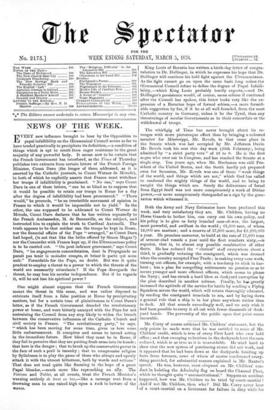NEWS OF THE WEEK.
EVERY new influence brought to bear by the Opposition to papal infallibility on the (Ecumenical Council seems so far to have tended practically to precipitate its definition,—a condition of things which is apt to result from eager resistance to the great majority of any powerful body. It seems now to be certain that the French Government has interfered, as the Times of Thursday publishes two extracts from certain letters of the French Foreign Minister, Count Dam (the longer of them addressed, as it is asserted by the Catholic journals, to Count Werner de 3,14rode), in both of which he explicitly asserts that France must withdraw her troops if infallibility is proclaimed. "No one," says Count Darn in one of these letters, "can be so blind as to suppose that it would be possible to retain our troops in Rome for a day after the dogma of infallibility had been pronounced." "There would," he proceeds, "be an irresistible movement of opinion in France to which it would be impossible not to yield." In the other, the one supposed to be addressed to Count Werner de Me'rode, Count Dam declares that he has written repeatedly to the French Ambassador, M. de Bonneville, on the subject, and instructed him to explain the truth to Cardinal Antonelli. The truth appears to be that neither can the troops be kept in Rome, nor the financial affairs of the Pope "arranged," as Count Darn had hoped, (is not that like the bribe offered by Simon Magus ?) nor the Concordat with France kept up, if the Ultramontane policy is to be carried out. "On pent infirmer gravement," says Count Darn, "lea engagements concordataires, dont la Propagande ne parait pas tenir le moindre e,ompte, et briser le pacte qui nous unit." Formidable for the Pope, no doubt. But was it quite prudent to employ a threat to a power to which the threats of the world are necessarily stimulants ? If the Pope disregards the threat, he may lose his secular independence. But if he regards it, will he not lose his spiritual power ?


































